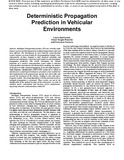Mostrar el registro sencillo del ítem
Intelligent vehicle communication: deterministic propagation prediction in transportation systems
| dc.creator | Azpilicueta Fernández de las Heras, Leyre | es_ES |
| dc.creator | Vargas Rosales, César | es_ES |
| dc.creator | Falcone Lanas, Francisco | es_ES |
| dc.date.accessioned | 2024-01-12T08:16:50Z | |
| dc.date.available | 2024-01-12T08:16:50Z | |
| dc.date.issued | 2016 | |
| dc.identifier.citation | Azpilicueta, L., Vargas-Rosales, C., Falcone, F. (2016) Intelligent vehicle communication: deterministic propagation prediction in transportation systems. IEEE Vehicular Technology Magazine, 11(3), 29-37. https://doi.org/10.1109/MVT.2016.2549995. | en |
| dc.identifier.issn | 1556-6072 | |
| dc.identifier.uri | https://hdl.handle.net/2454/47009 | |
| dc.description.abstract | Intelligent Transportation Systems (ITS) are currently under intense research and development for making transportation safer and more efficient. The development of such vehicular communication systems requires accurate models for the propagation channel. A key characteristic of these channels is their temporal variability and inherent non-stationarity, which has major impact on electromagnetic propagation prediction. This article investigates the channel properties of a wireless communication system within a vehicular communication environment with deterministic modeling. An analysis of the physical radio channel propagation of an ultra high frequencyradio frequency identification (UHF-RFID) system for a vehicle to infrastructure scattering environment is presented. A new module has been implemented in the proposed site-specific tool which takes into account the movement of the vehicles, leading to time and spacefrequency models. The strong dependence with the environment due to multipath propagation is presented. These results can aid in the identification of the optimal location of the transceivers, in order to minimize power consumption and increase service performance, improving vehicular communications within ITS. | en |
| dc.description.sponsorship | Ministry of Economy and Competitiveness of Spain, funding provided by Grant TEC2013-45585-C2-1-R. | en |
| dc.format.mimetype | application/pdf | en |
| dc.language.iso | eng | en |
| dc.publisher | IEEE | en |
| dc.relation.ispartof | IEEE Vehicular Technology Magazine, 11(3), 29-37 | en |
| dc.rights | © 2016 IEEE. Personal use of this material is permitted. Permission from IEEE must be obtained for all other uses, in any current or future media, including reprinting/republishing this material for advertising or promotional purposes, creating new collective works, for resale or redistribution to servers or lists, or reuse of any copyrighted component of this work in other work. | en |
| dc.title | Intelligent vehicle communication: deterministic propagation prediction in transportation systems | en |
| dc.type | Artículo / Artikulua | es |
| dc.type | info:eu-repo/semantics/article | en |
| dc.date.updated | 2024-01-12T08:12:01Z | |
| dc.contributor.department | Ingeniería Eléctrica y Electrónica | es_ES |
| dc.contributor.department | Ingeniaritza Elektrikoa eta Elektronikoa | eu |
| dc.rights.accessRights | Acceso abierto / Sarbide irekia | es |
| dc.rights.accessRights | info:eu-repo/semantics/openAccess | en |
| dc.identifier.doi | 10.1109/MVT.2016.2549995 | |
| dc.relation.projectID | info:eu-repo/grantAgreement/MINECO//TEC2013-45585-C2-1-R/ES/ | en |
| dc.relation.publisherversion | https://doi.org/10.1109/MVT.2016.2549995 | |
| dc.type.version | Versión aceptada / Onetsi den bertsioa | es |
| dc.type.version | info:eu-repo/semantics/acceptedVersion | en |


